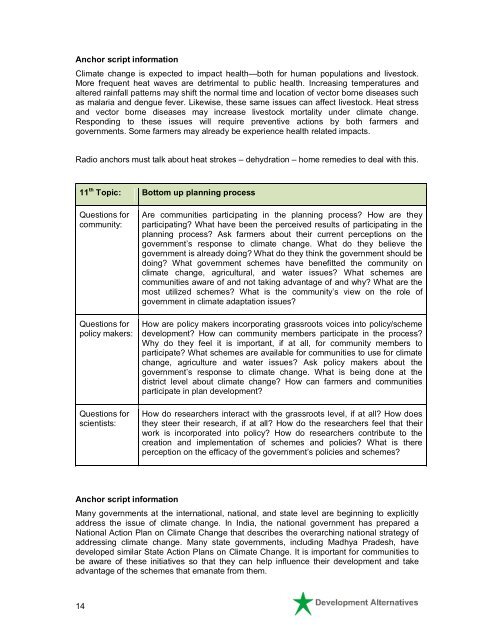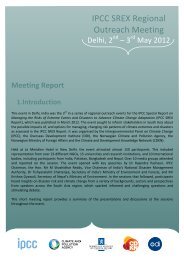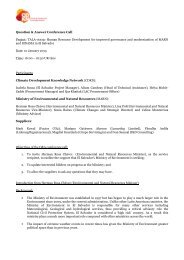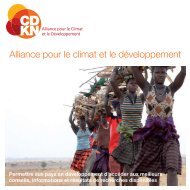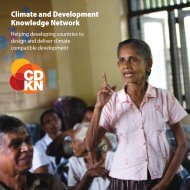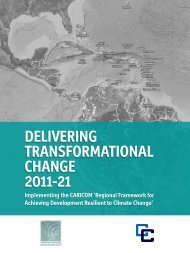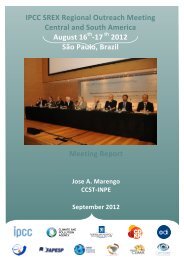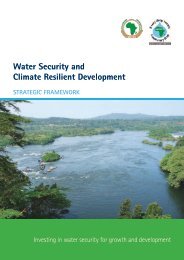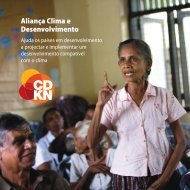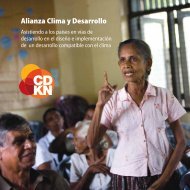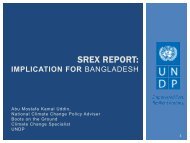Climate Change Guide for Community Radio ... - CDKN Global
Climate Change Guide for Community Radio ... - CDKN Global
Climate Change Guide for Community Radio ... - CDKN Global
You also want an ePaper? Increase the reach of your titles
YUMPU automatically turns print PDFs into web optimized ePapers that Google loves.
Anchor script in<strong>for</strong>mation<strong>Climate</strong> change is expected to impact health—both <strong>for</strong> human populations and livestock.More frequent heat waves are detrimental to public health. Increasing temperatures andaltered rainfall patterns may shift the normal time and location of vector borne diseases suchas malaria and dengue fever. Likewise, these same issues can affect livestock. Heat stressand vector borne diseases may increase livestock mortality under climate change.Responding to these issues will require preventive actions by both farmers andgovernments. Some farmers may already be experience health related impacts.<strong>Radio</strong> anchors must talk about heat strokes – dehydration – home remedies to deal with this.11 th Topic: Bottom up planning processQuestions <strong>for</strong>community:Questions <strong>for</strong>policy makers:Questions <strong>for</strong>scientists:Are communities participating in the planning process? How are theyparticipating? What have been the perceived results of participating in theplanning process? Ask farmers about their current perceptions on thegovernment’s response to climate change. What do they believe thegovernment is already doing? What do they think the government should bedoing? What government schemes have benefitted the community onclimate change, agricultural, and water issues? What schemes arecommunities aware of and not taking advantage of and why? What are themost utilized schemes? What is the community’s view on the role ofgovernment in climate adaptation issues?How are policy makers incorporating grassroots voices into policy/schemedevelopment? How can community members participate in the process?Why do they feel it is important, if at all, <strong>for</strong> community members toparticipate? What schemes are available <strong>for</strong> communities to use <strong>for</strong> climatechange, agriculture and water issues? Ask policy makers about thegovernment’s response to climate change. What is being done at thedistrict level about climate change? How can farmers and communitiesparticipate in plan development?How do researchers interact with the grassroots level, if at all? How doesthey steer their research, if at all? How do the researchers feel that theirwork is incorporated into policy? How do researchers contribute to thecreation and implementation of schemes and policies? What is thereperception on the efficacy of the government’s policies and schemes?Anchor script in<strong>for</strong>mationMany governments at the international, national, and state level are beginning to explicitlyaddress the issue of climate change. In India, the national government has prepared aNational Action Plan on <strong>Climate</strong> <strong>Change</strong> that describes the overarching national strategy ofaddressing climate change. Many state governments, including Madhya Pradesh, havedeveloped similar State Action Plans on <strong>Climate</strong> <strong>Change</strong>. It is important <strong>for</strong> communities tobe aware of these initiatives so that they can help influence their development and takeadvantage of the schemes that emanate from them.14


